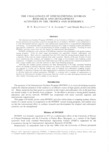The International Soybean Program (INTSOY) of the University of Illinois is seeking to improve human nutrition and economic conditions through the use of soybeans. INTSOY works collaboratively with like-minded national, regional, and international organizations in a) germplasm enhancement and testing; b) developing effective production practices for a range of cropping systems and different agro-climatic conditions; and c) the developing of locally accepted soy products. Funding for most INTSOY activities comes from the US Agency for International Development.
INTSOY collaborates with scientists in 80 different countries who participate in the global soybean testing program. Trials for three target environments are organized: tropical, subtropical, and temperate regions. Most cultivars originated from the USA when the testing program began but now a majority of the cultivars tested originate from other countries. Results of the past 10 years of trials show conclusively that soybeans are adapted to a wide range of environments and cropping system conditions. A number of countries have made direct use of the test cultivars for commercial production and a larger number have used the cultivars in their local breeding program.
Although the soybean genetic potential has been demonstrated to be high, expanded breeding efforts are needed to develop improved cultivars for many of the adverse conditions which soybeans are exposed to if they are to become widely used in tropical and subtropical cropping systems. INTSOY is, therefore working with other organizations to develop strong national and regional efforts to develop improved soybean germplasm. INTSOY is working with a number of organizations to develop an International Soybean Consortium/Network which can help developing countries meet their rapidly increasing needs for edible oil and protein.

